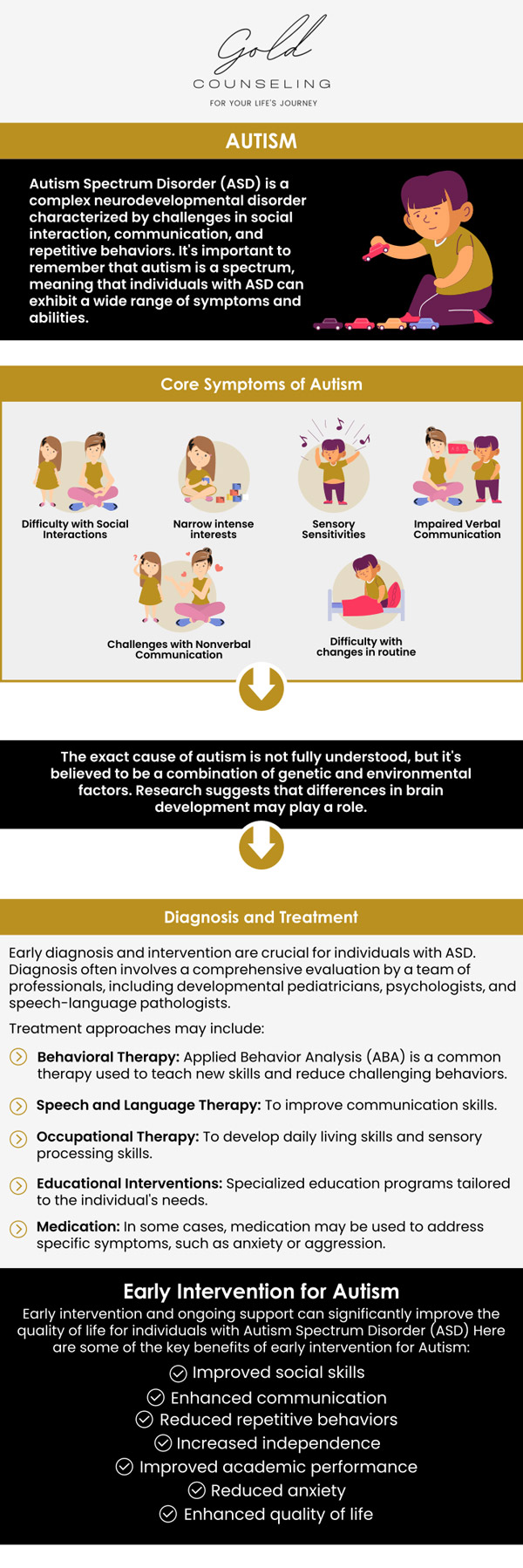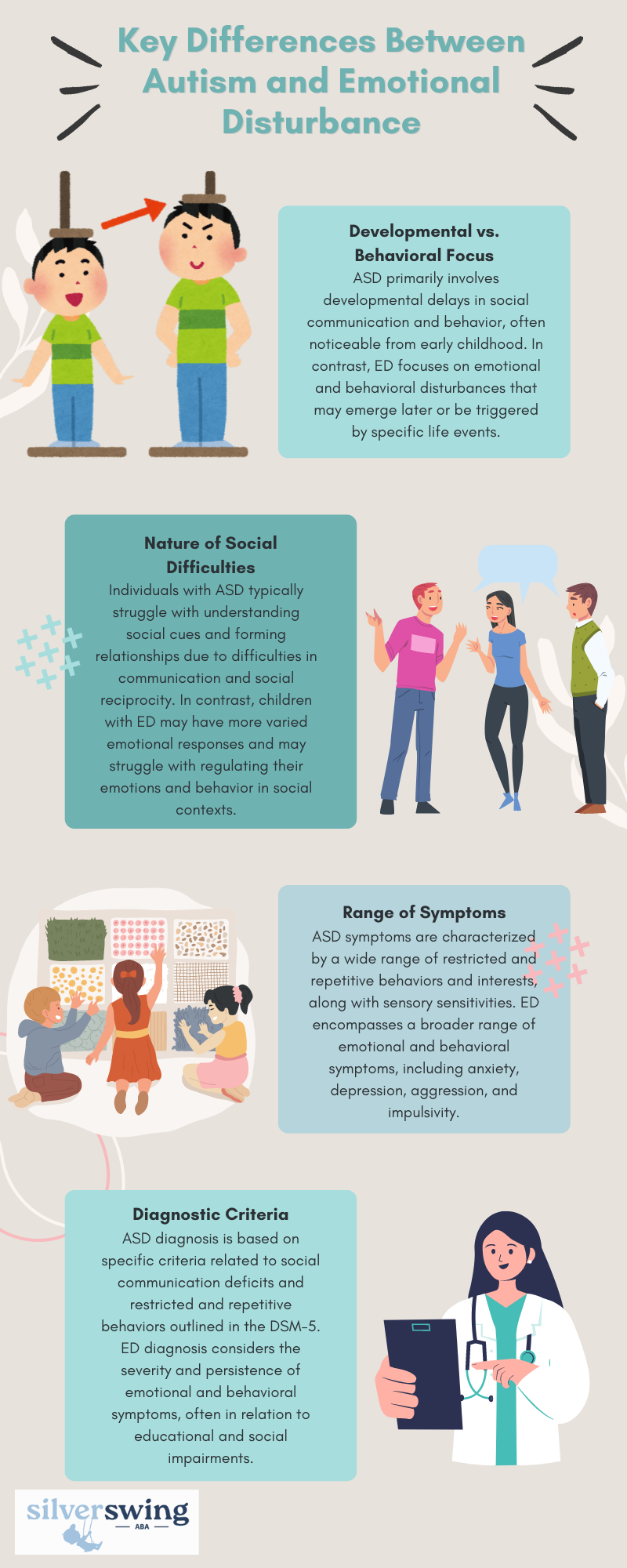How experts in Autism Spectrum Therapies address nonverbal communication barriers
How experts in Autism Spectrum Therapies address nonverbal communication barriers
Blog Article
Key Symptoms And Signs to Recognize in Individuals With Behavioral Autism
When you experience somebody with behavior autism, identifying essential signs and symptoms is essential. Furthermore, sensory level of sensitivities can lead to frustrating experiences.
Challenges in Social Interactions
When you connect with someone on the autism range, you may discover they fight with social hints and communication. These challenges can make social interactions feel frustrating for them. You may see them avoiding eye contact or standing also close or too away during conversations, which can produce misconceptions. They could not pick up on body language or face expressions, making it harder for them to gauge exactly how others are feeling.
When they do engage, they might speak concerning their passions in great detail without noticing if you're interested. Understanding these difficulties can help you approach interactions with empathy and patience, promoting a much more comfy environment for both of you.
Difficulty With Verbal and Non-Verbal Communication

Recognizing these signs is necessary, as it aids you far better support and engage with individuals on the autism range. By comprehending their interaction challenges, you can cultivate much more significant connections and provide a much more supportive setting.
Repetitive Behaviors and Routines
Communication difficulties typically come with various other signs of autism, such as repeated behaviors and a solid choice for regimens. You could notice that individuals with autism often take part in details, repetitive activities, like hand-flapping, rocking, or repeating expressions. These actions can give comfort and a feeling of control in an usually overwhelming globe.
When they follow a structured timetable,Regimens are equally crucial; lots of individuals prosper. You may find that modifications to these routines can cause substantial distress. As an example, if they have a day-to-day routine of consuming breakfast at a specific time or adhering to a particular path to college, any kind of interruption can cause stress and anxiety.
Acknowledging these patterns assists you understand their behavior and provide support. By accommodating their demand for regular and allowing recurring activities, you can produce an extra comfy atmosphere that reduces their obstacles.
Sensory Sensitivities

Usual Sensory Triggers
Sensory sensitivities can substantially affect everyday life for individuals with autism, as specific stimulations frequently activate frustrating responses. Common sensory triggers include loud sounds, brilliant lights, and solid scents. You could see that abrupt audios, like alarms or alarm systems, create anxiousness or distress. Similarly, fluorescent lights in shops can feel extreme and uneasy. Textures can additionally play a substantial role; rough textiles or particular food structures might be unbearable for you. Furthermore, crowded areas can overwhelm your senses, making it difficult to loosen up or concentrate. Comprehending these triggers can aid you manage your atmosphere much better. By recognizing what influences you, you can take actions to lessen discomfort and enhance your everyday experiences.
Behavioral Feedbacks Discussed
Recognizing your behavioral actions to sensory sensitivities is crucial, as they usually reveal how you interact with the globe. You might also find yourself looking for particular sensory experiences, like deep stress or peaceful settings, to aid ground yourself. Acknowledging these patterns helps you comprehend your demands better and can assist exactly how you connect them to others.
Coping Approaches Review
Acknowledging your sensory level of sensitivities is just the very first step; now it's time to explore coping techniques that can aid you handle those experiences effectively. Beginning by producing a sensory toolkit customized to your needs. Establishing an organized regimen can also provide predictability, minimizing anxiousness around sensory overload.
Restricted Interests and Focus
While numerous individuals establish a broad array of rate of interests, those with autism frequently show restricted rate of interests and an extreme concentrate on particular topics. You might notice that someone with autism can spend hours diving right into their preferred topic, whether it's a particular type of train, a specific film, or a clinical principle. This extreme focus isn't just a hobby; it can become a central component of their identification and social interactions.
You may find that discussions focus on these interests, and they might have a hard time to participate in broader topics. For them, these concentrated passions offer convenience and a feeling of proficiency. While it's essential to motivate exploration of brand-new topics, appreciating their interests is similarly crucial. By recognizing and recognizing these restricted passions, you can foster an encouraging atmosphere where they really feel valued and recognized, enabling even more purposeful links and communications.
Emotional Policy Difficulties
Individuals with autism usually encounter challenges in emotional law, which can be affected by their intense emphasis on certain interests. You might notice that when a person is deeply participated in a preferred task, they can experience solid emotions, whether excitement or disappointment. When points don't go as planned., this strength in some cases makes it tough for them to websites change equipments or manage their sensations - Autism Therapist.

Variability in Developmental Milestones
When it comes to developmental milestones, you'll observe that people with autism frequently show a vast array of variability. Some may hit turning points promptly, while others could lag behind or progress at a different pace. For instance, you might see a child excel in language abilities yet have problem with social communications. This inconsistency can be confusing, as conventional benchmarks don't always use.
It's important to identify that each person's journey is special. Observing these patterns can help you understand their strengths and requires much better.
Regularly Asked Questions
How Is Autism Identified in Kid and Adults?
To identify autism in grownups and youngsters, specialists review habits, interaction skills, and social communications. They commonly make use of standardized examinations, interviews, and monitorings to determine if an individual satisfies the criteria for autism spectrum problem.
Exist Various Kinds Of Autism Range Disorders?
Yes, there are different kinds of autism spectrum problems, consisting of Asperger's disorder and prevalent developing disorder-not or else specified. Each type varies in extent and qualities, so comprehending these differences can help you far better support people with autism.
What Treatments Work for Individuals With Autism?
When considering efficient therapies for people with autism, you'll locate choices like Applied Actions Evaluation, speech therapy, and work-related therapy. Each technique can aid enhance communication, social skills, and daily operating tailored to individual demands.
Can Individuals With Autism Lead Independent Lives?
Yes, individuals with autism can lead independent lives. With the ideal assistance, skills training, and sources, you can assist them develop self-sufficiency, handle daily tasks, and flourish in various environments, cultivating their self-reliance.
How Can Families Support Liked Ones With Autism?
You can support your enjoyed ones with autism by producing an organized environment, motivating their passions, practicing persistence, promoting interaction, and advertising social abilities. Commemorate their accomplishments, despite just how small, and construct a supportive community.
Although lots of individuals on the autism range can use and recognize language, they typically deal with considerable challenges with both non-verbal and spoken interaction. Identifying these indicators is vital, as it assists you much better support he said and engage with people on the autism range. You may notice that people with autism frequently engage in details, repeated activities, like hand-flapping, rocking, or repeating phrases.Sensory sensitivities can considerably affect daily life for individuals with autism, as specific stimulations frequently activate overwhelming reactions.When it comes to developing turning points, you'll discover that people with autism often reveal a vast array of irregularity.
Report this page